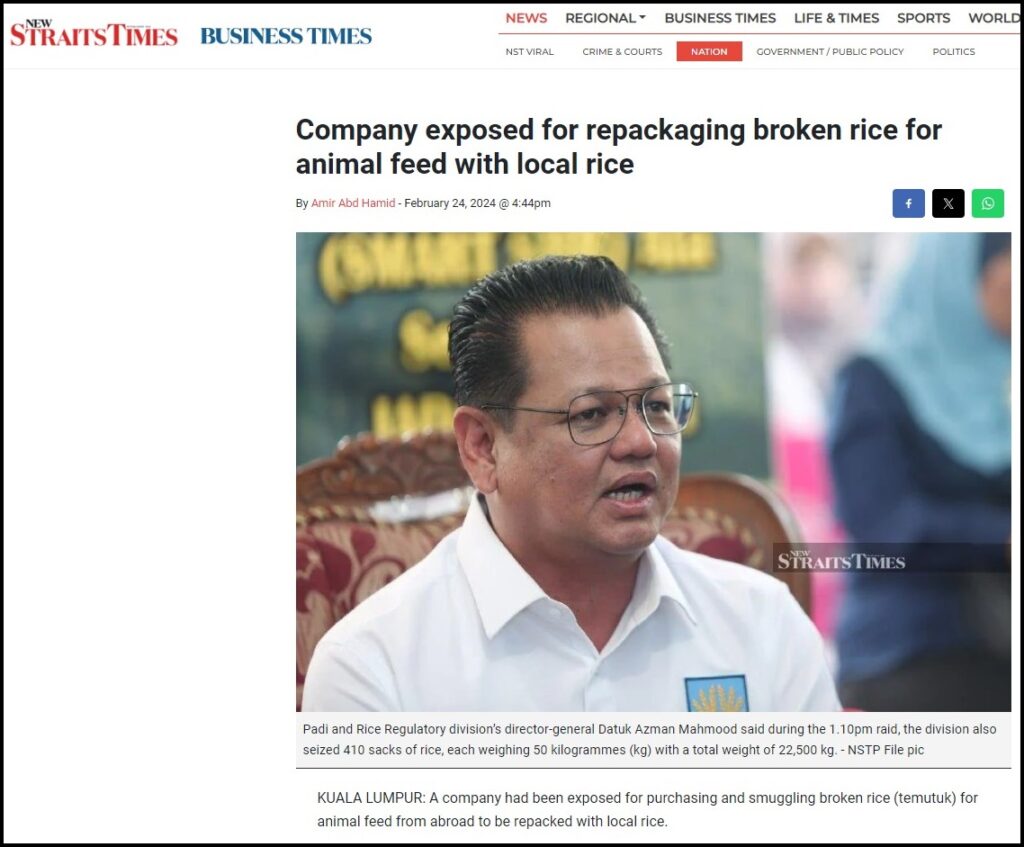


KUALA LUMPUR: A company had been exposed for purchasing and smuggling broken rice (temutuk) for animal feed from abroad to be repacked with local rice.
The company’s modus operandi was detected in a raid at a rice mill near U5, Shah Alam which was conducted by the Padi and Rice Regulatory Division, yesterday.
The division’s director-general Datuk Azman Mahmood said during the 1.10pm raid, the division also seized 410 sacks of rice, each weighing 50 kilogrammes (kg) with a total weight of 22,500 kg.
“The raid was carried out based on information and complaints lodged by the public on illegal rice. The modus operandi involves purchases from wholesalers particularly rice for animal feed and the inspection revealed that each sack contains no label on it.
“However, we have yet to determine which country the smuggling of broken rice was purchased from, (and) there is a possibility that it is from Vietnam or Thailand.
“Investigations on the matter is underway and preliminary investigation revealed that the rice will be resold to wholesalers at a specific price.
“It will then depend on the wholesalers to mix it (the broken rice) into local white rice or to sell it to the noodle industries,” he said.
Azman added that the investigation also found that the involved party had taken advantage of the increase in imported rice prices by mixing it with the broken rice.
As a result of the mixture of rice, he said that the rice had also been sold at higher prices and marketed as premium rice, Basmathi rice as well as other imported rice at the current market price.
“They were found to have mixed the rice more than the allowed percentage, which is five per cent.
“Hence, we will continue to have comprehensive inspections to ensure that consumers do not receive poor-quality rice.”
Also seized during the inspection were related documents, namely an original wholesale rice license, a purchase invoice for rice, a proforma invoice for rice and a copy of the Companies Commission of Malaysia form.
He also said that confiscated rice was stored at the Padiberas Nasional Bhd (Bernas) warehouse in Port Klang, while confiscated documents were taken to the division’s headquarters in Putrajaya for further investigation.
“There will be further follow-up raids related to this case based on the information obtained.
“The company in question is currently under investigation for suspected violations under Regulation 9(4) of the Control of Padi and Rice (Licensing of Wholesalers And Retailers) Regulations 1996. P.U (A) 624.
“(And) if found guilty under Section 22(2) of the Control of Padi and Rice Act 1994 (No. 522), they can be fined up to RM25,000 for the first offence,” he said.
He also reminded that any wholesale license holder involved in rice packaging must display a label or tag indicating the grade, weight, price, name, license number, and percentage of broken rice content on the rice packaging or container.
Meanwhile, Malaysian Muslim Consumers Association (PPIM) chief activist Datuk Nadzim Johan said the control at the country’s main entry points needs to be tightened to ensure that the smuggling of broken rice to be mixed with local rice does not easily pass through.
Failure to do so will only result in price manipulation of the commodity while consumers do not get the quality they deserve, he said.
He also said that such issue of mixing low-quality rice with local white rice is not new and has been reported in the media.
He said it is time for issues of ‘escaped’ products at the main entry points to be addressed properly through integrated methods between agencies.
“We do not know how long this activity has been going on and how much profit they have made by deceiving consumers.
“I remember that Harian Metro also reported on mixed rice about 10 years ago, and it seems that such things are still happening.
“We hope that the authorities will open their eyes and eradicate the issue until this irresponsible activity is fully exposed,” he said.
Article by: New Straits Times
COMPANY EXPOSED FOR REPACKAGING BROKEN RICE FOR ANIMAL FEED WITH LOCAL RICE